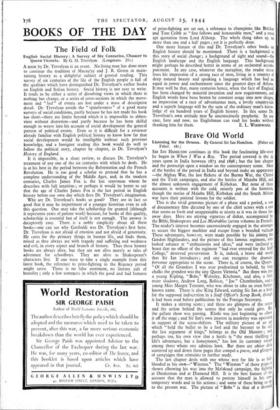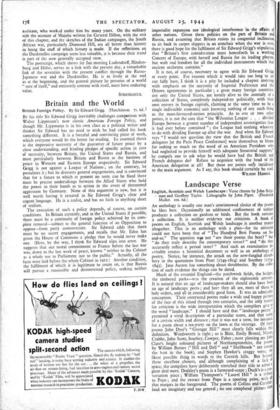Brave Old World
SIR IAN HAMILTON continues in this book the fascinating life-story he began in When I Was a Boy. The period covered is the 25 years spent in India between 1873 and 1898; but the last chapter and the postscript open a window on the contemporary scene. Most of the battles of the period in India and beyond make an appearance —the Afghan War, the last flickers of the Burma War, the Chitral and the Tirah campaigns, and also the battles of Majuba Hill, and the almost unknown engagement of Kirbekan. But none of these accounts is written with the cold, miserly pen of the historian, though the stories of Majuba Hill, Kirbekan and the South African war have their pointed lessons for the soldier.
This is the vivid generous picture of a phase and a period, a sort of documentary film directed by one of the chief actors with a zest that seems as fresh and unappeasable at ninety as it was in those far- away days. Here are stirring vignettes of shikar, accompanied by the Bible, Shakespeare and Les Miserables (seven volumes in French). The reader's interest becomes unconsciously engaged in the attempts to secure the biggest markhor and escape from a bearded vulture These adventures, howe /et, were made possible by his joining the Gordon Highlanders, and the picture of this famous regiment, who looked askance at "enthusiasms and ideas," and were inclined to boast that no officer of the regiment "had ever entered for the Staff College," deserved preservation It is, indeed, a brave old world that Sir Ian introduces ; and one can recognise the dreonaus personae appropriate to the scene. There is, of course, the Queen: "Of all the Grandees I was ever predestined to behold, by long chalks the grandest was the tiny Queen Victoria." But there was also a young Kipling, "Bobs," Wolseley, Kitchener, and also, a little more shadowy, Andrew Lang, Balfour, " Joe " Chamberlain, and 3 young Miss Margot Tennant, who was about to take an even better; known name. There is also King Edward, cutting Sir Ian at a levee for the supposed indiscretion in a Staff Officer's Scrap Book, though it had been read before publication by the Foreign Secretary. It makes a stirring scene ; and there are glimpses of the actors and the action behind the scenes that only he could give. But the gallant show was passing. Khaki was just beginning to elbow it off the stage ; and Sir Ian's own interest in musketry was operating in support of the scene-shifters. The military picture of an aFe which "held the bullet to be a fool and the bayonet to be still the last argument of kings," belongs to the Old Masters ; and; perhaps too, his own view that a battle is "the most thrilling life's adventures, bar a honeymoon," has list its currency exc.ePt among those whom one admires least. But there are obiter dicta scattered up and down these pages that compel a pause, and glimPo of campaigns that stimulate to further study. The last chapter deals with one whose zest for life is as lug' blooded as his own—" Winston." The " Winston " of these pages, shown elbowing his way into the Malalcand campaign, the fightog at Omdurman and at Diamond Hill. It is the best feature of tltt account that the man is allowed to portray himself in his 00" temporary words and in his actions ; and some of these bring us to the present war. The picture of " Bobs " is that of a 'devote'
assistant, who worked under him for many years. On the military side the account of Majuba written for General Dillon, with the rest of this chapter, and the sketches of the Indian campaigns, the South African war, particularly Diamond Hill, are all better than history in being the stuff of which history is made. If the reflections on the Dardanelles campaign seem less valuable, it is because their trend is part of the now generally accepted view.
The postscript, which shows Sir Ian meeting Ludendorff, Hinden- burg and Hitler, serves as a link with the present day, a remarkable link of the seventies with the present conflict through the Russo- Japanese war and the Dardanelles. He is as lively at the end as at the beginning, and the general picture he presents of a world "sure of itself," and eminently content with itself, must have enduring value.
STRATEGICUS.



























 Previous page
Previous page